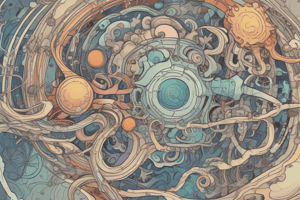Podcast
Questions and Answers
Match the following developmental stages with their corresponding abilities:
Match the following developmental stages with their corresponding abilities:
Newborn baby = See, hear, and feel Age of five = Talk, ride a bike, invent imaginary friends Age of three = Hundred trillion connections in the brain First few years of life = Experiences affect brain development
Match the following sensory information with their role in brain development:
Match the following sensory information with their role in brain development:
Sight, hearing, smell, taste, touch = Receives information for brain connections Listening to different sounds = Activates part of the brain responsible for speech Images of babies' brains = Showed more activity during specific sound patterns Experiences in first few years = Affect the development of the brain
Match the following terms with their description:
Match the following terms with their description:
Neurons = Nearly a hundred billion in a newborn baby's brain Connections between different parts of the brain = Created by information received through senses Hundred trillion connections at age three = Result of information received through senses Sequences of sounds 'A-B-B' and 'A-B-C' = Used in an experiment to observe brain activity
Match the following technology usage with their purpose in studying children's brains:
Match the following technology usage with their purpose in studying children's brains:
Match the following findings with their corresponding study or experiment:
Match the following findings with their corresponding study or experiment:
Flashcards are hidden until you start studying
Study Notes
Developmental Stages and Abilities
- Infancy involves sensory exploration, motor skill development, and attachment formation.
- Early childhood emphasizes language acquisition, social skills, and basic problem-solving abilities.
- Middle childhood focuses on logical thinking, self-regulation, and peer relationships.
- Adolescence is marked by abstract reasoning, identity exploration, and emotional development.
Sensory Information and Brain Development
- Visual stimuli are crucial for forming neural connections related to sight and spatial awareness.
- Auditory information enhances language development and auditory processing skills.
- Tactile experiences lead to the development of fine motor skills and sensory integration.
- Olfactory and gustatory senses play significant roles in memory formation and emotional responses.
Terms and Descriptions
- Neuroplasticity refers to the brain's ability to reorganize itself by forming new neural connections throughout life.
- Critical period signifies a time frame in which specific skills or abilities must be developed.
- Executive function encompasses mental processes that help with planning, focus, and self-control.
- Attachment theory explains the emotional bonds formed between caregivers and children, influencing future relationships.
Technology Usage in Studying Children's Brains
- fMRI (functional Magnetic Resonance Imaging) tracks brain activity by measuring blood flow, providing insights into cognitive functions.
- EEG (Electroencephalogram) measures electrical activity in the brain, offering real-time data on brain responses.
- Eye-tracking technology monitors visual attention and interest, shedding light on developmental preferences.
- Neuropsychological assessments evaluate cognitive functioning through standardized tests, helping identify developmental delays.
Findings and Corresponding Studies
- The study of infant brain development revealed the importance of responsive caregiving for cognitive growth.
- Research on bilingualism showed that children who learn multiple languages exhibit advanced executive function skills.
- Experiments on screen time suggested potential negative impacts on attention spans and social skills development.
- Longitudinal studies on attachment styles demonstrated links between early attachment experiences and adult relational patterns.
Studying That Suits You
Use AI to generate personalized quizzes and flashcards to suit your learning preferences.




